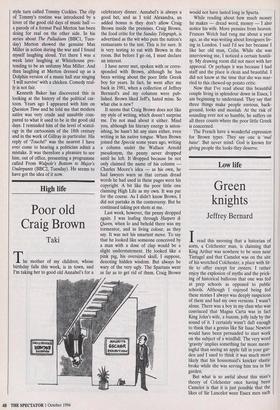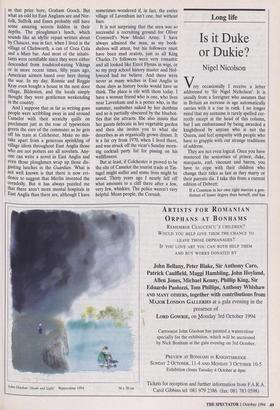Low life
Green knights
Jeffrey Bernard
Iread this morning that a historian of sorts, a Colchester man, is claiming that King Arthur was nowhere to be seen near Tintagel and that Camelot was on the site of his wretched Colchester, a place with lit- tle to offer except for oysters. I rather enjoy the explosion of myths and the prick- ing of historical balloons that one was fed at prep schools as opposed to public schools. Although I enjoyed being fed these stories I always was deeply suspicious of them and had my own versions. I wasn't alone. There was a boy in my class who was convinced that Magna Carta was in fact King John's wife, a buxom, jolly lady by the sound of it. I certainly wasn't daft enough to think that a genius like Sir Isaac Newton would have been persuaded to start work on the subject of a windfall. The very word `gravity' implies something far more mean- ingful than seeing an apple fall in your gar- den and I used to think it was much more likely that his housemaid's knicker elastic broke while she was serving him tea in his garden.
But what is so awful about this man's theory of Colchester once having been Camelot is that it is just possible that the likes of Sir Lancelot were Essex men such as that prize bore, Graham Gooch. But what an odd lot East Anglians are and Nor- folk, Suffolk and Essex probably still have some amazing secrets hidden in their depths. The ploughman's lunch, which sounds like an idyllic repast written about by Chaucer, was in fact, when I lived in the village of Chelsworth, a can of Coca Cola and a Mars bar. And most of the inhabi- tants were certifiable since they were either descended from toadstool-eating Vikings or in more recent times, fifty years ago, American airmen based over here during the war. In my day, Ronnie and Reggie Kray even bought a house in the next door village, Bildeston, and the locals simply thought they were gentlemen weekending in the country.
And I suppose that as far as writing goes people were scribbling away in and around Camelot with their scratchy quills on parchment just as the roar of typewriters greets the ears of the commuter as he gets off his train at Colchester. Make no mis- take apart from a generous sprinkling of village idiots throughout East Anglia those who are not potters are all novelists. Any- one can write a novel in East Anglia and even those ploughmen wrap up those dis- gusting lunches in the Guardian. What is not well known is that there is now evi- dence to suggest that Merlin invented the corndolly. But it has always puzzled me that there aren't more mental hospitals in East Anglia than there are, although I have sometimes wondered if, in fact, the entire village of Lavenham isn't one, but without bars.
It is not surprising that the area was so successful a recruiting ground for Oliver Cromwell's New Model Army. I have always admired the man, as my book- shelves will attest, but his followers must have been mad zealots, just as all King Charles I's followers were very romantic and all looked like Errol Flynns in wigs, or so my prep school history master and Hol- lywood had me believe. And there were never as many witches in East Anglia in those days as history books would have us think. The place is rife with them today. I have a woman friend who is one, who lives near Lavenham and is a potter who, in the summer, sunbathes naked by her dustbins and so is partially obscured by the bluebot- tles that she attracts. She also insists that her guests defecate in her vegetable garden and then she invites you to what she describes as an organically grown dinner. It is a far cry from 1970, when I lived there, and was struck off the vicar's Sunday morn- ing cocktail party list for pissing on his wallflowers.
But at least, if Colchester is proved to be the site of Camelot the tourist trade at Tin- tagel might suffer and some lives might be saved. Thirty years ago I nearly fell off what amounts to a cliff there after a few, very few, whiskies. The police weren't very helpful. Mean people, the Cornish.



























































 Previous page
Previous page